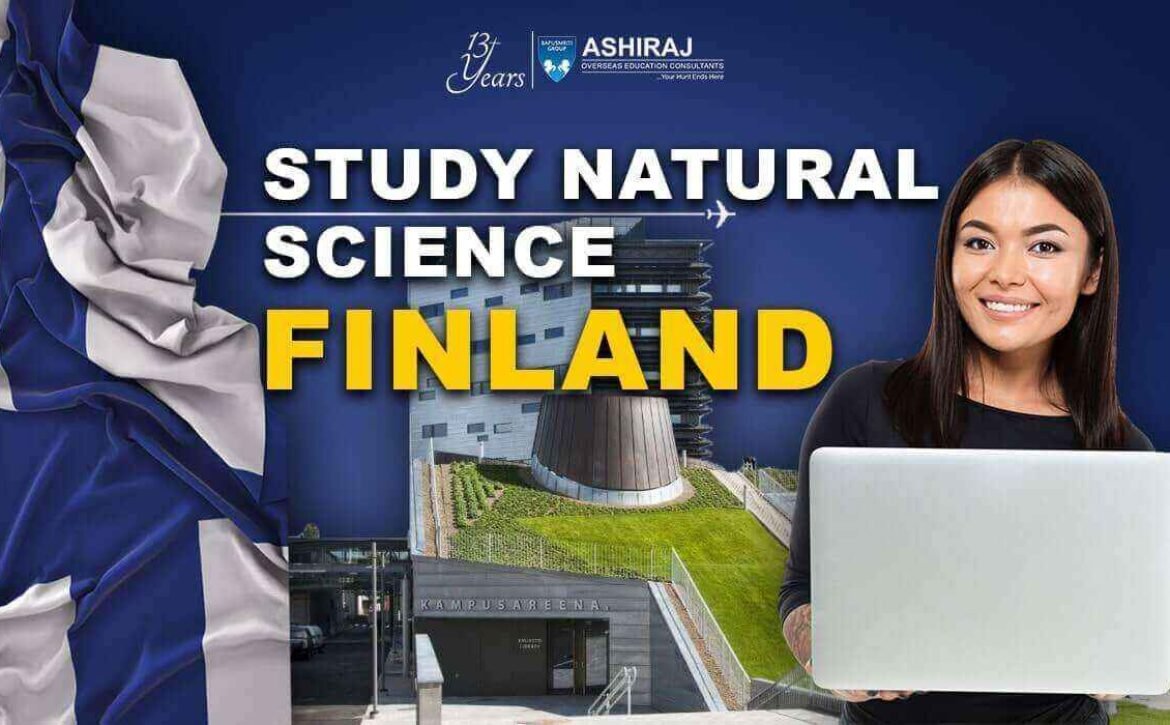
Natural Science in Finland
Welcome to the fascinating realm of Natural Science in FINLAND, where the pristine landscapes and innovative minds converge to unravel the mysteries of the natural world. Finland, with its rich biodiversity and commitment to sustainability, provides an ideal backdrop for scientific exploration. From the enchanting forests of Karelia to the shimmering lakes of Lapland, the diverse ecosystems fuel a vibrant scientific community dedicated to understanding and preserving the country’s unique natural heritage.
In the heart of this scientific endeavor are renowned institutions like the University of Helsinki and Aalto University, where cutting-edge research in fields such as environmental science, biology, and renewable energy takes place. The Natural Science in FINLAND transcends traditional boundaries, fostering interdisciplinary collaboration to address global challenges. As we delve into the intricacies of this scientific landscape, we uncover a tapestry of knowledge woven by passionate researchers, making significant contributions to our understanding of the natural world.
Why to Study Natural Science in Finland?
- Rich Biodiversity: Finland boasts diverse ecosystems, providing an ideal environment for studying natural science. From the archipelagos to the Arctic tundra, students can explore a wide range of habitats.
- Cutting-edge Research Institutions: Renowned universities like the University of Helsinki and Aalto University are at the forefront of natural science research. Students benefit from state-of-the-art facilities and collaborate with leading experts.
- Sustainable Practices: Finland is a global leader in sustainability. Studying natural science here allows students to witness and contribute to innovative solutions for environmental challenges, aligning education with real-world impact.
- Interdisciplinary Approach: Natural science in Finland transcends traditional boundaries, encouraging interdisciplinary collaboration. Students can engage with a holistic approach to problem-solving, preparing them for the complex challenges of the modern world.
- International Environment: Finland’s commitment to education and proficiency in English makes it an attractive destination for international students. Exposure to diverse perspectives enhances the learning experience.
- Practical Learning Opportunities: Finland emphasizes hands-on, practical learning. Fieldwork in the country’s stunning natural landscapes enriches the educational experience, providing a deeper understanding of scientific principles.
In conclusion, choosing to study Natural Science in FINLAND offers a unique and enriching academic experience. The combination of rich biodiversity, cutting-edge research institutions, sustainable practices, an interdisciplinary approach, an international environment, and practical learning opportunities makes it a compelling choice for aspiring scientists.
Top Universities to Study Natural Science in Finland
Rank | University | QS World University Ranking 2023 | Type of University | Average Annual Fees (in EUR) | Programs Offered |
1 | University of Helsinki | 78 | Public | 0-15,000 | Natural Sciences, Environmental Science |
2 | Aalto University | 132 | Public | 12,000-15,000 | Physics, Chemistry, Biology |
3 | University of Oulu | 305 | Public | 8,000-12,000 | Earth Sciences, Biochemistry |
4 | University of Turku | 350 | Public | 9,000-14,000 | Ecology, Geology, Molecular Biology |
5 | Lappeenranta-Lahti University of Technology | 501-510 | Public | 10,000-13,000 | Environmental Engineering, Biotechnology |
When considering pursuing Natural Science in FINLAND, the choice of university is pivotal. The top five universities in Finland for Natural Science, based on the QS World University Rankings 2023, offer diverse programs and are renowned for their academic excellence. The University of Helsinki, ranking at 78, stands out for its comprehensive programs in Natural Sciences and Environmental Science, making it an attractive choice. Aalto University, securing the 132nd position, specializes in Physics, Chemistry, and Biology, providing students with a robust foundation in these fields. The University of Oulu, University of Turku, and Lappeenranta-Lahti University of Technology also feature prominently, offering programs ranging from Earth Sciences and Biochemistry to Ecology and Environmental Engineering. Consideration of average annual fees reveals that these institutions provide quality education at a reasonable cost, making Finland an appealing destination for those aspiring to excel in Natural Science.
Course Curriculum for Natural Science in Finland
- Interdisciplinary Foundations: The curriculum of Natural Science programs in Finland emphasizes interdisciplinary learning, offering a well-rounded education. Students delve into the intersections of physics, chemistry, biology, and environmental science.
- Practical Application: A distinctive feature is the focus on practical application. The coursework incorporates extensive laboratory work and field studies, providing hands-on experience. This approach aligns education with real-world challenges, preparing students for impactful contributions.
- Research Opportunities: Finland’s universities encourage student involvement in research from an early stage. This exposure cultivates critical thinking and problem-solving skills. Students actively engage in projects, contributing to the advancement of scientific knowledge.
- Sustainable Perspectives: Given Finland’s commitment to sustainability, Natural Science programs integrate ecological perspectives. Students explore solutions to environmental challenges, fostering a deep understanding of the importance of sustainable practices.
- International Collaboration: The course structure promotes international collaboration, exposing students to diverse perspectives. Collaborative projects and exchange programs enhance cultural understanding and prepare graduates for a global scientific community.
In conclusion, the Natural Science curriculum in Finland is designed to offer a comprehensive and dynamic learning experience. With a blend of theoretical knowledge, practical application, research opportunities, sustainability focus, and international collaboration, students pursuing Natural Science in Finland gain a holistic education that equips them for success in the ever-evolving field of scientific exploration.
Eligibility Criteria & Admission Requirements for Natural Science in Finland
Academic Requirements:
- Bachelor’s Degree: A relevant bachelor’s degree in Natural Science or a related field is typically required for admission.
- Academic Performance: Strong academic performance in undergraduate studies, usually with a minimum GPA of 3.0 on a 4.0 scale.
- Language Proficiency:
Test | Minimum Score |
IELTS | 6.5 |
TOEFL | 90 |
- Language Proficiency: Proficiency in English is crucial. Applicants need to provide scores from either IELTS or TOEFL, with the mentioned minimum scores.
Standardized Tests:
Test | Minimum Score |
GRE | 310 |
GMAT | 650 |
- Standardized Tests: Depending on the university, applicants may need to submit scores from either GRE or GMAT. The minimum scores are specified in the table.
Additional Requirements:
- Passport & Student Visa: A valid passport is required, and students must obtain a student visa before arriving in Finland.
- Academic Certificates: Certified copies of academic transcripts and degree certificates from previous institutions.
- Work Experience: Some programs may require relevant work experience, particularly for advanced degrees.
Adhering to these eligibility criteria ensures a smooth application process for Natural Science in FINLAND, opening doors to a world-class education and research opportunities.
Documents Required for Studying Natural Science in Finland
- Passport: A valid passport is a fundamental requirement. Ensure it has ample validity beyond your intended stay in Finland.
- Letters of Recommendation (LOR): Typically, two LORs are needed. These should come from academic or professional references who can attest to your qualifications and capabilities.
- Statement of Purpose (SOP): The SOP outlines your academic and career goals, explaining why you are a suitable candidate for the Natural Science program in Finland.
- Curriculum Vitae (CV): A comprehensive CV provides a snapshot of your academic and professional journey, showcasing relevant experiences and achievements.
- Official High School Transcripts: Transcripts from your high school education, demonstrating your academic performance and eligibility for higher studies.
- Educational Certificates: Copies of degree certificates from previous academic institutions, verifying your qualifications.
- Work Experience Certificate: If applicable, a certificate detailing your work experience in the field of Natural Science.
- Proof of Financial Resources: To obtain a student visa, you must demonstrate sufficient financial means to cover tuition, living expenses, and other related costs.
Ensuring the completeness of these documents is crucial for a seamless application process for Natural Science in FINLAND. Each document plays a unique role in presenting a holistic picture of your academic background, qualifications, and readiness for the program.
Admission Process for Natural Science in Finland
- Research and Choose Universities: Explore universities offering Natural Science programs in Finland. Consider factors like reputation, faculty, and program structure.
- Check Eligibility Criteria: Ensure you meet the eligibility requirements, including academic qualifications, language proficiency (IELTS or TOEFL), and standardized test scores (GRE or GMAT).
- Prepare Documents: Gather essential documents, including passport, academic transcripts, educational certificates, letters of recommendation (LOR), statement of purpose (SOP), curriculum vitae (CV), work experience certificates, and proof of financial resources.
- Application Submission: Complete the online application form for the selected universities. Pay attention to deadlines and submit all required documents.
- Wait for Admission Decision: Universities will review your application. Be patient during the evaluation process, and check for any additional steps or interviews required.
- Receive Offer Letter: Upon acceptance, you’ll receive an offer letter. Review the terms and conditions, including tuition fees and deadlines.
- Acceptance and Visa Application: Confirm your acceptance and proceed to apply for a student visa. Ensure your passport is valid for the duration of your studies.
- Arrival in Finland: Plan your arrival and attend any orientation sessions provided by the university. Familiarize yourself with the campus and the local surroundings.
- Commence Studies: Attend the mandatory orientation programs, register for classes, and embark on your Natural Science journey in FINLAND.
By following these steps, you can navigate the admission process smoothly and embark on a fulfilling academic experience in the field of Natural Science in FINLAND
“Education is the most powerful weapon which you can use to change the world.”
Nelson Mandela
Cost of Natural Science Course in Finland
- Tuition Fees: Public universities in Finland offer tuition-free education for EU/EEA students. However, for non-EU/EEA students, tuition fees for Natural Science programs may range from 8,000 to 15,000 EUR per year.
- Living Expenses: Estimate living costs, including accommodation, food, transportation, and miscellaneous expenses. On average, students might need around 700 to 1,000 EUR per month.
- Accommodation: Options include student housing, private rentals, or shared apartments. Monthly rents vary, with student housing typically ranging from 250 to 600 EUR.
- Health Insurance: EU/EEA students should have European Health Insurance. Non-EU/EEA students usually need to obtain comprehensive health insurance, costing approximately 160 to 200 EUR per year.
- Books and Supplies: Budget for textbooks and study materials, which may range from 600 to 1,000 EUR annually.
- Transportation: Public transportation costs are reasonable, with a monthly student pass averaging around 40 to 50 EUR.
- Personal Expenses: Allocate funds for personal expenses, entertainment, and other miscellaneous costs, estimated at around 200 to 300 EUR per month.
Understanding the cost of studying Natural Science in FINLAND is crucial for financial planning. While tuition fees apply to non-EU/EEA students, the overall expenses are manageable, considering the quality of education and the country’s commitment to sustainability and innovation in the field of Natural Science.
Scholarships for Natural Science Courses in Finland
Scholarship Name | Eligibility Criteria | Amount | Application Deadline |
University of Helsinki Scholarship | International Master’s applicants | Tuition fee waiver | January 15th |
Aalto University Scholarship | Non-EU/EEA students | 4,000 to 12,000 EUR | January 15th |
EDUFI Fellowships | Doctoral level studies | Monthly allowance | Year-round application |
CIMO Scholarship Program | Undergraduate and Master’s level applicants | Varies | March 31st (Annual) |
Finnish Government Scholarship Pool | Doctoral level studies | 1,500 EUR per month | December 15th (Annual) |
- University of Helsinki Scholarship: Open to international Master’s applicants, this scholarship covers tuition fees and is due on January 15th.
- Aalto University Scholarship: For non-EU/EEA students pursuing Master’s programs, offering financial support ranging from 4,000 to 12,000 EUR. Deadline: January 15th.
- EDUFI Fellowships: Available for doctoral-level studies, providing a monthly allowance. Applications are accepted year-round.
- CIMO Scholarship Program: For undergraduate and Master’s level students, offering variable financial support. Deadline for applications is March 31st annually.
- Finnish Government Scholarship Pool: Geared towards doctoral level studies, providing a monthly stipend of 1,500 EUR. Application deadline is December 15th annually.
Exploring these scholarships for Natural Science in FINLAND can significantly alleviate the financial burden of pursuing higher education, making the academic journey more accessible to aspiring scientists.
Career Opportunities After Natural Science in Finland
Job Profile | Description | Average Salary (EUR) |
Research Scientist | Conducting experiments, analyzing data, and publishing findings | 50,000 – 70,000 |
Environmental Consultant | Assessing environmental impact, advising on sustainability | 40,000 – 60,000 |
Biotechnologist | Applying biological principles to develop new technologies | 45,000 – 65,000 |
Data Scientist | Analyzing and interpreting complex data sets | 60,000 – 80,000 |
Renewable Energy Engineer | Designing and implementing sustainable energy solutions | 50,000 – 70,000 |
- Research Scientist: Engage in groundbreaking research, contributing to advancements in Natural Science. Average Salary: 50,000 – 70,000 EUR.
- Environmental Consultant: Assess and advise on environmental sustainability, working with organizations to reduce ecological impact. Average Salary: 40,000 – 60,000 EUR.
- Biotechnologist: Apply biological knowledge to develop innovative technologies and products. Average Salary: 45,000 – 65,000 EUR.
- Data Scientist: Analyze complex data sets to extract insights and drive decision-making processes. Average Salary: 60,000 – 80,000 EUR.
- Renewable Energy Engineer: Design and implement sustainable energy solutions, contributing to the green energy transition. Average Salary: 50,000 – 70,000 EUR.
Completing Natural Science programs in FINLAND opens diverse career pathways, with competitive salaries and opportunities for impactful contributions to the scientific community and environmental sustainability.
Frequently Asked Questions About Natural Science in Finland
Yes, many universities in Finland offer Natural Science programs in English, making them accessible to international students.
Yes, various scholarships are available, such as the University of Helsinki Scholarship and CIMO Scholarship Program, supporting international students financially.
Tuition fees vary, but for non-EU/EEA students, it generally ranges from 8,000 to 15,000 EUR per year.
Graduates can pursue careers as research scientists, environmental consultants, biotechnologists, data scientists, and renewable energy engineers, with competitive average salaries.
No, as many programs are offered in English. However, learning basic Finnish can enhance your overall experience.
The duration varies, but for Master’s programs, it typically takes 2 years, and doctoral programs may take 4-5 years.
Requirements include a relevant bachelor’s degree, language proficiency tests (IELTS or TOEFL), and, in some cases, standardized tests (GRE or GMAT).
Yes, as an international student, you are generally allowed to work part-time during your studies.
After receiving an acceptance letter from the university, you can apply for a student visa through the Finnish embassy or consulate in your home country.
On average, students may need around 700 to 1,000 EUR per month to cover living expenses, including accommodation, food, transportation, and personal expenses.




